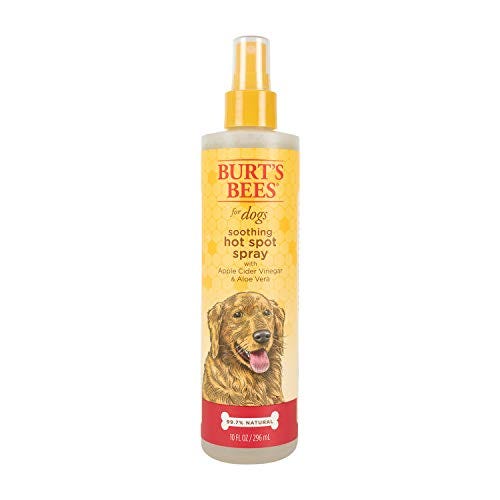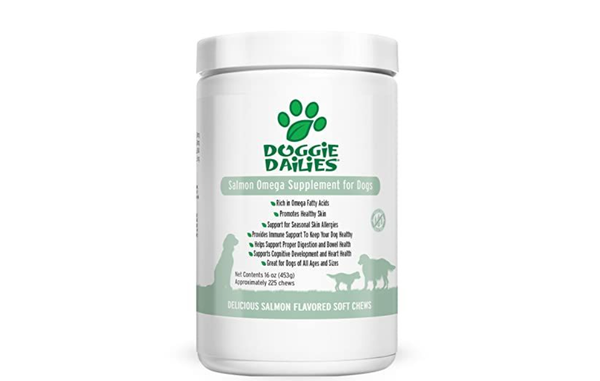Apple cider vinegar is increasing in trendiness by the day, available in various forms like gummies to potentially help with things like bloating and shampoos to reveal healthier hair. It’s no surprise that pets are getting in on the action, too.
But while ACV has been rumored to help with certain ailments, it’s important to always run it by your veterinarian before giving it to your dog, as ACV has not been medically proven to be beneficial for dogs, and could be dangerous in some instances, says Jamie Whittenburg, DVM, a veterinarian at Senior Tail Waggers, and director of Kingsgate Animal Hospital in Lubbock, Texas. Here’s what you need to know about giving apple cider vinegar to your furry family members.
Apple Cider Vinegar for Dogs
According to Courtney Jackson, DVM, a veterinarian and owner of the Pets Digest blog, apple cider vinegar is safe for dogs to use on their skin and take internally if given in moderation and at recommended doses.
“When using apple cider vinegar internally, it should always be diluted in water and given at a dose of no more than 1 teaspoon per 50 pounds,” she says.
Can apple cider vinegar be harmful to dogs?
As with most things, your dog can definitely have too much of a good thing if they ingest too much ACV, as it can cause gastrointestinal upset and lead to vomiting and diarrhea. ACV also has the potential to cause throat burns as it is an acid, Dr. Jackson says.
If your dog has been diagnosed with diabetes and is on medication or is taking diuretics, ACV should be given under the close supervision of your vet with regular check-ups and blood work, as it has the potential to cause hypoglycemia if given with insulin and lower potassium to a dangerous level if taken with diuretics or “water pills,” she says.
How to use apple cider vinegar for dog ear infections
This is one area where you’ll definitely want to skip ACV and opt for actual medical treatment, Dr. Whittenberg says.
According to Dr. Whittenberg, apple cider vinegar should never be used to treat an ear infection; rather you should always take them to the vet if you suspect they’re dealing with one. This is because ear infections are caused by bacteria or yeast, deep down in the ear canal, and dogs will often hide their pain and discomfort until the infection is severe. In fact, you should not put anything into the ear canal without the supervision and advice of your veterinarian, she says.
“Unlike human ear infections, dog ear infections occur in the external canal and it is somewhat common for the infection to cause a tear or hole in the dog’s ear drum, and an owner cannot visualize the ear drum, deep within the ear,” she explains. “If it is compromised, anything placed into the canal can enter the middle ear and may cause permanent deafness, among other complications.”
How to use apple cider vinegar for dog’s itchiness
According to Dr. Wittenberg, there are many reasons why a dog may be itchy, with the top causes usually being fleas, contact allergies, environmental allergies, food allergies, and skin infections. Other causes can include autoimmune disorders, thyroid dysfunction, skin conditions such as seborrhea, and scabies mites. Since ACV won’t treat any of these ailments, it’s important to first seek out a proper diagnosis before they worsen.
However, apple cider vinegar can work well on a dog’s skin when it comes to mild itchiness and irritation like hot spots because it has anti-inflammatory properties due to its acetic acid and alpha hydroxy acid, Dr. Jackson says.
“When used topically as a flea or tick deterrent, for allergy and itchy skin relief, or in ears it should be diluted as well,” she says. “A good dilution ratio is one part ACV to two parts distilled water.”
For use on the skin, you can place the solution into a spray bottle for ease of use, Dr. Jackson advises. Make sure to shake the solution well so the ACV is evenly distributed.
Apple cider vinegar supplements for dogs
Unsurprisingly, there are over-the-counter apple cider vinegar sprays and supplements for dogs available on the market. Dr. Jackson recommends the below options:
Burt’s Bees for Dogs Hot Spot Spray for Dogs
Burt’s Bees products for humans have a reputation for having natural, soothing ingredients, so it’s no surprise that they have quality items for pets as well. This spray contains aloe in addition to ACV to restore pH balance and relieve irritation from hot spots.
Doggie Dailies Omega 3 for Dogs
Omega-3 supplements are often recommended to help dogs maintain healthy skin, coats, and joints. These have a bonus ingredient of ACV to help promote a healthy immune system, among the other aforementioned benefits.







